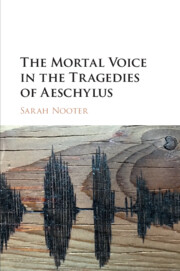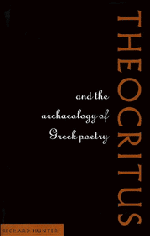Greek Poetry in the Age of Ephemerality
£85.00
- Author: Sarah Nooter, University of Chicago
- Date Published: April 2023
- availability: Available
- format: Hardback
- isbn: 9781009320351
£
85.00
Hardback
Other available formats:
Paperback, eBook
Looking for an inspection copy?
This title is not currently available on inspection
-
This book suggests that poetry offers a way to remain in the world – not only by declarations of intent or the promotion of remembrance, but also through the durable physicality of its practice. Whether carved in stone or wood, printed onto a page, beat out by a mimetic or rhythmic body, or humming in the mind, poems are meant to engrave and adhere. Ancient Greek poetry exhibits a particularly acute awareness of change, decay, and the ephemerality inherent in mortality. Yet it couples its presentation of this awareness with an offering of meaningful embodiment in shifting forms that are aligned with, yet subtly manipulative of, mortal time. Sarah Nooter's argument ranges widely across authors and genres, from Homer and the Homeric Hymns through Sappho and Archilochus to Pindar and Aeschylus. The book will be compelling reading for all those interested in Greek literature and in poetry more broadly.
Read more- Demonstrates how Greek poetry began the process of grappling with the fleeting quality of life that is found in much poetry throughout human history
- Explores topics of enduring relevance in literary and cultural studies, such as rhythm, metaphor, the idea of the future, and the idea of ruins
- Shows how contemporary theories, such as those of materiality and presence, can bring insights into our understanding of ancient material
Reviews & endorsements
'Greek Poetry in the Age of Ephemerality offers a bold reassessment of archaic and classical Greek poetry. Sarah Nooter explores temporality as a key aspect of song that allows her to bring together various strands - notably, embodiment, performance, and textual transmission. Her use of new materialism, phenomenology, sound studies, and approaches to affects is sophisticated and yields many original interpretations of poems by Archilochus, Sappho, and other authors. Well argued and engagingly written, Nooter's book is a pleasure to read.' Jonas Grethlein, Professor of Classics, Universität Heidelberg
See more reviews'Sarah Nooter's new book, Greek Poetry in the Age of Ephemerality, is a fascinating exploration of time and the body in ancient poetry and poetics from Homer to Aeschylus. The place where these elements intersect is in song, music, rhythm, and the voice, which present the most ephemeral features of poetry and yet are the source of its most lasting effects. The book is an invitation to recover a richly embodied experience that is not ours, from works that we still treat as timeless today. Such is the paradoxical challenge of this highly readable study, which is certain to make a contribution to the material turn in Classics.' James I. Porter, Distinguished Professor of Rhetoric and Classics, University of California, Berkeley
'I loved this book. Written with style and wit, Nooter's Greek Poetry in The Age of Ephemerality breathes new life into archaic Greek lyric. Avoiding reductive binaries and clichéd notions of ephemerality and permanence, Nooter reanimates both ancient and contemporary ideas about poetry and poetic immortality. Attuned to extraordinary affect as well as to life's more ordinary rhythms and temporalities, her readings show us how the body itself endures, whether in mummified form, as a chorus of dancers, or as the movement, rhythm, and sound that both originate from and return us to poet and performer.' Melissa Mueller, Professor of Classics, University of Massachusetts Amherst
The book is a pleasure to read. The writing is clear, graceful, and occasionally witty.' Michael R. Halleran, Bryn Mawr Classical Review
Customer reviews
Not yet reviewed
Be the first to review
Review was not posted due to profanity
×Product details
- Date Published: April 2023
- format: Hardback
- isbn: 9781009320351
- length: 228 pages
- dimensions: 250 x 176 x 20 mm
- weight: 0.62kg
- availability: Available
Table of Contents
1. Did the heart beat? Rhythm and the body in ancient Greek poetry
2. The substance of song: music in Homer and the Homeric Hymns
3. The erotics of again: time and touch in Sappho
4. Situating Simonides: stones, song, and sound
5. Writing the future: Pindar, Aeschylus, and the tablet of the mind
6. Recovering the bodies of Archilochus' Cologne Epode and Timotheus' Persae.
Sorry, this resource is locked
Please register or sign in to request access. If you are having problems accessing these resources please email [email protected]
Register Sign in» Proceed
You are now leaving the Cambridge University Press website. Your eBook purchase and download will be completed by our partner www.ebooks.com. Please see the permission section of the www.ebooks.com catalogue page for details of the print & copy limits on our eBooks.
Continue ×Are you sure you want to delete your account?
This cannot be undone.
Thank you for your feedback which will help us improve our service.
If you requested a response, we will make sure to get back to you shortly.
×





